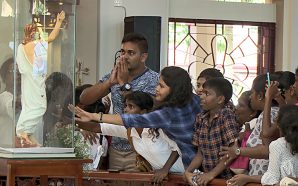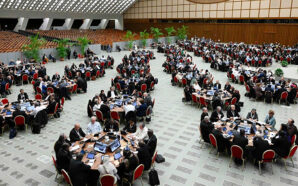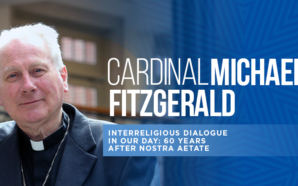The message of Australia’s first saint is resonating well through the work of Catholic education in her country, giving hope for tomorrow
When Pope Benedict XVI canonised St Mary MacKillop – the first Australian to be recognised by the Catholic Church as a saint – he recalled her tieless legacy on behalf of those on the margins of society.
At the canonisation Mass in St Peter’s Square in 2010, he said that MacKillop – who lived from 1842 to 1909 – “dedicated herself as a young woman to the education of the poor in the difficult and demanding terrain of rural Australia, inspiring other women to join her in the first women’s community of religious sisters of that country.
“She attended to the needs of each young person entrusted to her without regard for station of wealth, providing both intellectual and spiritual formation,” the Pope continued. “Despite many challenges…this holy woman had the graces needed to remain faithful to God and to the Church. Through her intercession, may her followers today continue to serve God and the Church with faith and humility!”
The Joeys
At the time of MacKillop’s canonisation, she was hailed as a “saint for out times” – and rightly so – and her work and message remains all the more relevant in today’s Church, both in Australia and around the globe.
As one of eight children born of Scottish immigrants, MacKillop was particularly attuned to the plight of migrants, often struggling to make ends meet and find a place for themselves in a new land.
MacKillop and the Josephite Sisters she founded (lovingly referred to as “the Joeys”) went where very few people dared to go at the time by establishing orphanages and schools in the Australian ‘bush’ (or underdeveloped areas), working alongside the country’s Indigenous peoples and among society’s poorest communities.

Our Diocesan Patron, St Mary of the Cross MacKillop. Image: Used with permission of the Trustees of the Sisters of Saint Joseph.
Moreover, when she discovered that a missionary priest from Ireland had been abusing children, she daringly reported the case, leading to his removal from the country. Her actions angered some of the local clergy and hierarchy, leading to a tumultuous relationship that led to her eventual excommunication – a move that was later reversed, and which resulted in her full exoneration.
National hero
For a country like Australia, still reeling from the fallout of decades of clergy sexual abuse scandals and a long overdue reconciliation with its Indigenous population, MacKillop’s open heartedness, combined with her willingness to boldly confront the abuse of power, has made her a national hero.
“What she stood for really encapsulates the vales and spirit of Australia, and this is why her appeal goes much beyond just that of the Catholic community,” said Chiara Porro, Australia’s ambassador to the Holy See, on the tenth anniversary of her canonisation.
On a recent visit to Australia in November 2023, I found myself in Blacktown, in the western suburbs of Sydney and one of the most multiculturally diverse communities in the region. There, I visited Nagle College, a Catholic school in the Diocese of Parramatta, and as I entered I noticed the school’s motto largely inscribed on its façade: In Deed Not Word.
Those were the words of the Venerable Honora Nagle, who founded the Presentation Sisters. These Sisters later started the school, but they also reminded me of the legacy of MacKillop.
Inside the school, which was established in 1965 and today served over 600 students, its principal Delma Horan proudly boasted of the school’s work on the frontlines of those on the margins today.
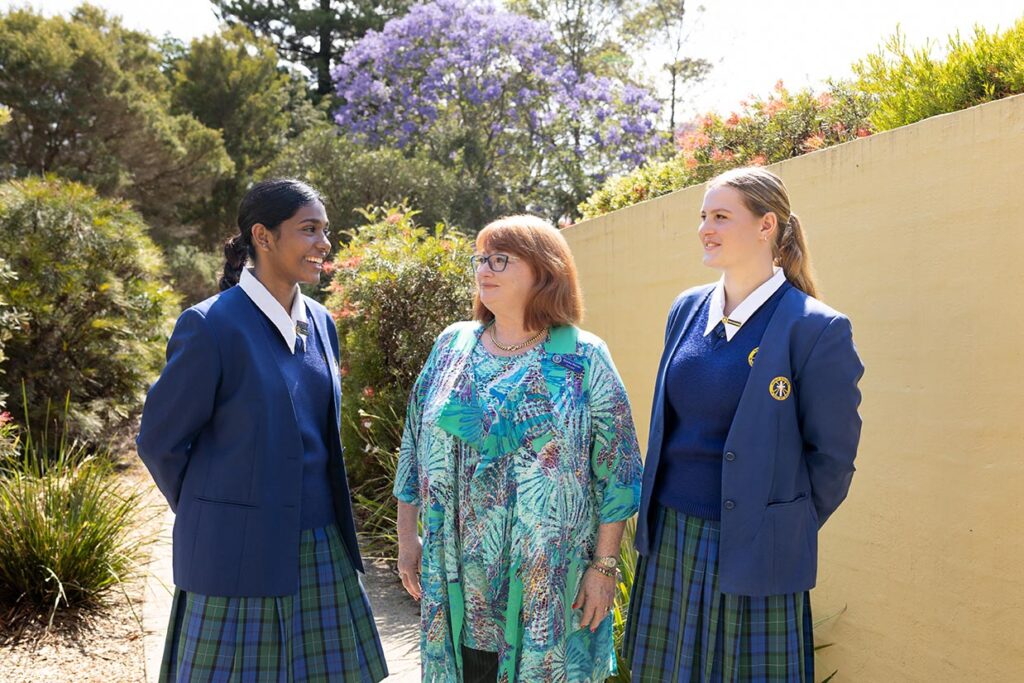
Nagle College, Blacktown, Principal Delma Horan (centre) with students Angelina (left) and Isabelle. Image: Catholic Schools Parramatta Diocese/Supplied
Horan recalled the ever-changing face of the school and the region, where various waves of migration have brought Irish and Italian new arrivals, now more recently followed by those from the subcontinent and Sudan.
Today, the school has an enrolment of students from over 70 different nationalities and next year will have more Hindu students than Catholic ones.
“We know a lot of families who are single parents living with seven children in a garage, and we’re working with families who are trauma survivors,” she said, noting that their work extends far beyond the realm of classroom education, but includes the challenges of feeding, clothing and buying supplies for many of their students – corporal works of mercy extending far beyond the classroom.
As I toured their facilities, Frank Chiment, the Principal Leader of the neighbouring Patrician Brothers’ College in Blacktown, quoted from Parramatta’s Bishop Vincent Long who likes to remind people that “students belong in our schools, but because they are Catholic, but because we are.”
“Both of our schools draw from some of the poorest postcodes in Australia,” said Chiment of Nagle College and Patrician Brothers’ College.
“We got to the margins and to the people who are doing it tough because we want to educate their kids and their families,” he continued. “We want to give them an education so we can educate them and liberate them with better opportunities.”
Character formation
Of the more than a thousand students enrolled at Patrician Brothers’ College, Chiment said that many come from difficult or impoverished backgrounds and despite being in “one of the most expensive cities in the world,” families are prioritising a Catholic education because of the values that these institutions pass on to the next generation.
Chiment says that the Catholic schools in Parramatta provide not just “a formal education,” but also “character formation.”
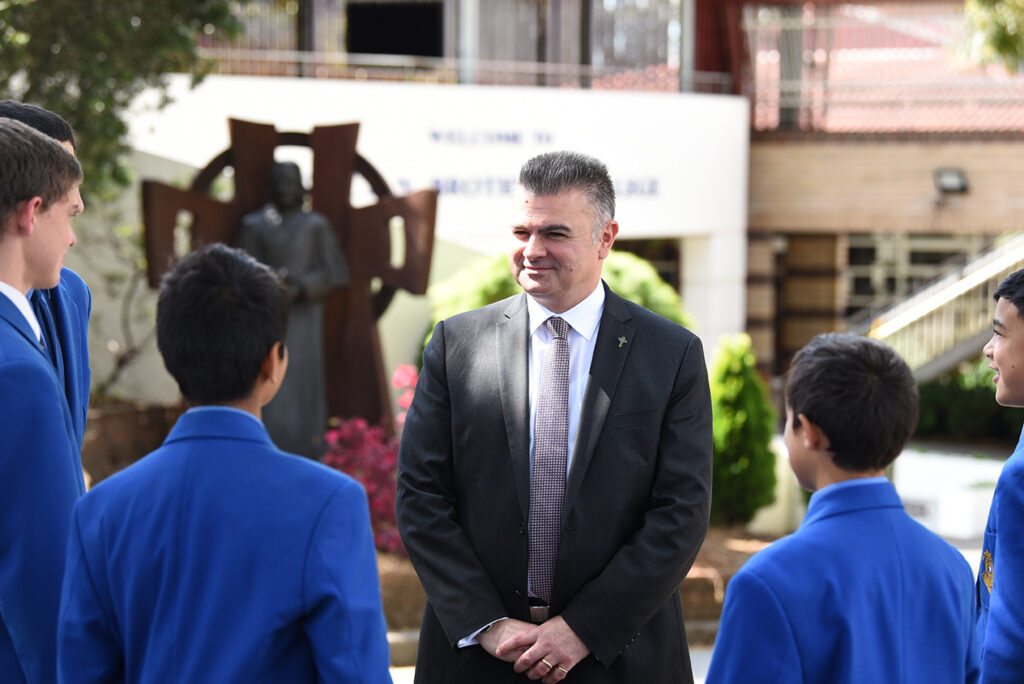
Patrician Brothers’ College, Blacktown, Principal Frank Chiment speaks with students. Image: Catholic Schools Parramatta Diocese/Supplied
Reflecting on the legacy of missionaries like MacKillop, the Patrician Brothers and the Presentation Sisters, Chiment acknowledged that these institutions stand on “the shoulders of these giants.”
In conversations with students at these institutions, they seemed to be deeply aware of this reality, as well.
Zackary Armitage, a year ten student at Patrician Brothers’ College, said after seeing this witness lived out each day that he now hopes to return to the school as a teacher in the future. Citing the example of some of his teachers, he said the Catholic education he has received has made him both “more passionate and compassionate.”
Angelina Rajadurai, a year twelve student on the cusp of graduating from Nagle College, said that a Catholic education means “lifting each other up.”
“It’s enhancing your peers’ faith and them doing the same for you,” she said. Isabelle Grills had an even more direct summation of her experience in Catholic education: “It’s hope for the future.”
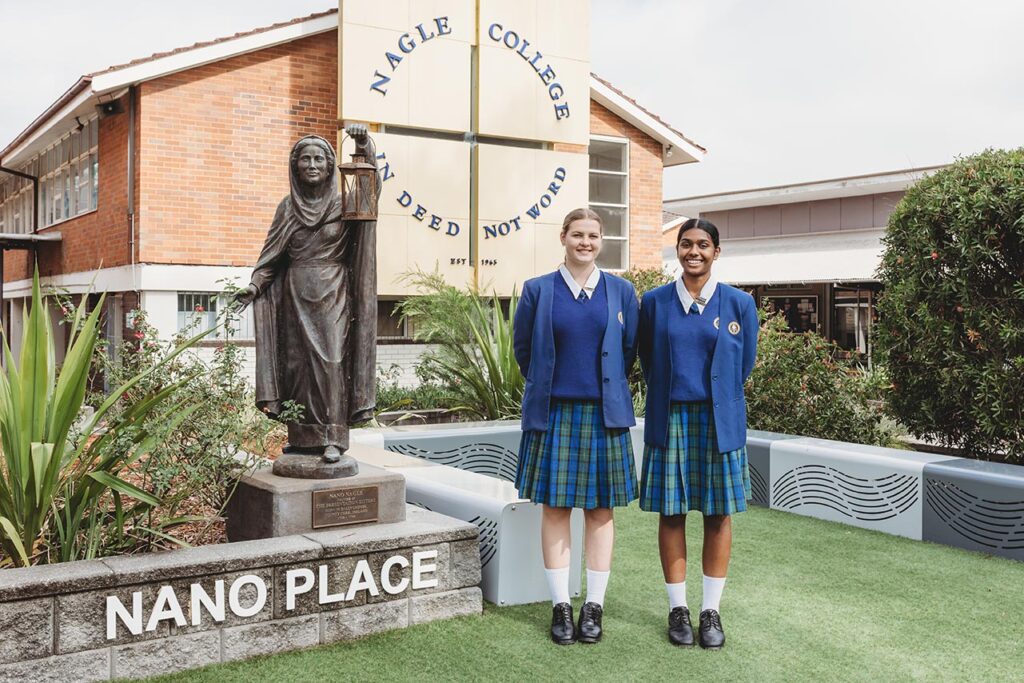
Nagle College, Blacktown, students Isabelle (left) and Angelina. Image: Catholic Schools Parramatta Diocese/Supplied
Pope Francis’ tribute
On June 28, 2023, at his weekly general audience in St Peter’s Square, Pope Francis paid tribute to the legacy of MacKillop.
“Mary was convinced that she…was sent to spread the Good News and attract others to an encounter with the living God,” Francis recalled.
“Wisely reading the signs of the times, she understood that for her, the best way to do so was through the education of the young with the awareness that Catholic education is a form of evangelisation,” he said.

A portrait of St Mary of the Cross MacKillop during her canonisation ceremony at St Peter’s Basilica, Rome. Image: Sisters of St Joseph of the Sacred Heart/Supplied
“An essential characteristic of her zeal for the Gospel was caring for the poor and marginalised,” he continued. “And this is very important: on the path to holiness, which is the Christian path, the poor and marginalised are the protagonists, and a person cannot advance in holiness if her or she is not dedicated to them too, in one way or another.”
Active faith
In offering her own reflections on what Catholic education should look like in the world today, Nagle’s principal, Delma Horan, said it requires asking, “What does active faith look like? And what’s its effect on the world?”
Frank Chiment, principal of Patrician Brothers’ College, said he recalled once being asked by someone: “Where is Jesus in your school?”
“I think the guiding question is ‘what would Jesus do?’” he said. “Seeing the face of God in the others…keeps us grounded.”
In extolling the virtues of MacKillop at the June 2023 general audience at the Vatican, Francis prayed that “may Saint Mary MacKillop’s missionary discipleship, her creative response to the needs of the Church of her time and her commitment to the integral formation of young people inspire all of us today, called to be a leaven of the Gospel in our rapidly changing societies.”
“May her example and intercession support the daily work of parents, teachers, catechists and all educators, for the good of young people and for a more humane and hopeful future,” he prayed.
That’s a message that is resonating well through the work of Catholic education in Australia today and giving hope for tomorrow.
This article was originally published in the February 2024 edition of the Messenger of St Anthony Magazine, published by the Conventual Franciscan friars of the Basilica of Saint Anthony in Padua, Italy. Reproduced with permission.





